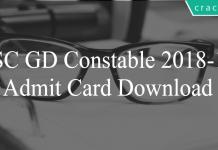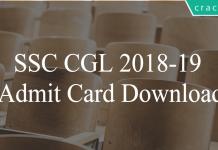SSC CGL Arithmetic questions
Download Top-20 Arithmetic questions for SSC CGL exam. Most important arithmetic questions based on asked questions in previous exam papers for SSC CGL.
Download SSC CGL Arithmetic questions
Get 125 SSC CGL Mocks – Just Rs. 199
Take a free SSC CGL Tier-1 mock test
Download SSC CGL Tier-1 Previous Papers PDF
Question 1: If X = 0.3 $\times$ 0.3, the value of X is
a) 0.009
b) 0.03
c) 0.09
d) 0.08
Question 2: An equation of the form ax + by + c = 0. Where, a ≠ 0, b ≠ 0 and c = 0 represents a straight line which passes through
a) (2, 4)
b) (0, 0)
c) (3, 2)
d) None of these
Question 3: The fifth term of the sequence for which $t_{1}=1$, $t_{2}=2$ and $t_{n+2}$ = $t_{n}+t_{n+1}$, is
a) 5
b) 10
c) 6
d) 8
Question 4: Reduce 3596 / 4292 to lowest terms.
a) 29/37
b) 17/43
c) 31/37
d) 19/23
Question 5: Reduce 2530/1430 to lowest terms.
a) 47/17
b) 23/13
c) 47/19
d) 29/17
Question 6: The first and last terms of an arithmetic progression are -32 and 43. If the sum of the series is 88, then it has how many terms?
a) 16
b) 15
c) 17
d) 14
Question 7: 29 is 0.8% of?
a) 3625
b) 1450
c) 7250
d) 10875
Question 8: 5*[-0.6 (2.8 + 1.2)] of 0.3 is equal to
a) -1.44
b) -1.08
c) -1.2
d) -3.6
Question 9: Find the value of p if 3x + p, x – 10 and -x + 16 are in arithmetic progression.
a) 16
b) 36
c) -16
d) -36
Question 10: If 9/4th of 7/2 of a number is 126, then 7/2th of that number is …………..
a) 56
b) 284
c) 72
d) 26
Question 11: The 4th term of an arithmetic progression is 15, 15th term is -29, find the 10th term?
a) -5
b) -13
c) -17
d) -9
Question 12: (91 + 92 + 93 + ……… +110) is equal to
a) 4020
b) 2010
c) 6030
d) 8040
Question 13: 40.36 – (9.347 – x ) – 29.02 = 3.68. Find x.
a) -56.353
b) 1.687
c) -17.007
d) 82.407
Question 14: What is the value of (81 + 82 + 83 + ……… +130)?
a) 5275
b) 10550
c) 15825
d) 21100
Question 15: In an arithmetic progression if 13 is the 3rd term, 47 is the 13th term, then 30 is which term?
a) 9
b) 10
c) 7
d) 8
Get 125 SSC CGL Mocks – Just Rs. 199
Question 16: The first and last terms of an arithmetic progression are 37 and -18. If the sum of the series is 114, then it has how many terms?
a) 13
b) 12
c) 14
d) 15
Question 17: If 4/5th of 6/7th of a number is 216, then 8/9th of that number will be
a) 179
b) 280
c) 160
d) 269
Question 18: 199994 x 200006 = ?
a) 39999799964
b) 39999999864
c) 39999999954
d) 39999999964
Question 19: In an arithmetic progression, if 17 is the 3rd term, -25 is the 17th term, then -1 is which term?
a) 10
b) 11
c) 9
d) 12
Question 20: In an arithmetic progression, if 9 is the 5th term, -26 is the 12th term, then -6 is which term?
a) 11
b) 8
c) 10
d) 7
Join Exam Preparation Telegram Group
More SSC CGL Important Questions and Answers PDF
Answers & Solutions:
1) Answer (C)
Expression : $X=0.3\times0.3$
=> $X=0.09$
=> Ans – (C)
2) Answer (B)
As c=0, and substituting the point (0,0) in the equation, we get ax+by+c = 0 at the point (0,0).
Hence, the line passes through origin.
3) Answer (D)
$t_{1}=1$, $t_{2}=2$
$t_{n+2}$ = $t_{n}+t_{n+1}$
put n=3, then $t_{5}$ = $t_{3}+t_{4}$
$t_{3}$ = $t_{1}+t_{2}$ = 1+2 = 3
$t_{4}$ = $t_{2}+t_{3}$ = 2+3 = 5
$t_{5}$ = $t_{3}+t_{4}$ = 3+5 = 8
so the answer is option D.
4) Answer (C)
Expression : $\frac{3596}{4292}$
Dividing both numerator and denominator by 4, = $\frac{899}{1073}$
Similarly, dividing by 29, we get :
= $\frac{31}{37}$
=> Ans – (C)
5) Answer (B)
Expression : $\frac{2530}{1430}$
Dividing both numerator and denominator by 10, we get = $\frac{253}{143}$
Similarly, dividing by 11, we get :
= $\frac{23}{13}$
=> Ans – (B)
6) Answer (A)
First term of AP, $a=-32$ and last term, $l=43$
Let there be $n$ terms
Sum of AP = $\frac{n}{2}(a+l) = 88$
=> $\frac{n}{2}(-32+43)=88$
=> $\frac{11n}{2}=88$
=> $n=88 \times \frac{2}{11}$
=> $n=8 \times 2=16$
=> Ans – (A)
7) Answer (A)
Let the number be $x$
According to ques, 0.8% of $x$ = 29
=> $\frac{0.8}{100} \times x = 29$
=> $\frac{x}{125} = 29$
=> $x = 29 \times 125 = 3625$
=> Ans – (A)
8) Answer (D)
Expression : 5*[-0.6 (2.8 + 1.2)] of 0.3
= $5 [(-0.6) \times (4)] \times 0.3$
= $5 \times (-2.4) \times 0.3$
= $(-12) \times 0.3 = -3.6$
=> Ans – (D)
9) Answer (D)
Terms in arithmetic progression : $(3x + p) , (x – 10) , (-x + 16)$
=> Difference between first two terms is equal to the difference between last two terms
=> $(x – 10) – (3x + p) = (-x + 16) – (x – 10)$
=> $-2x -10 – p = -2x + 16 + 10$
=> $-p = 26 + 10 = 36$
=> $p = -36$
=> Ans – (D)
10) Answer (A)
Let the number be $x$
According to ques,
=> $\frac{9}{4} \times \frac{7}{2} \times x = 126$
=> $\frac{63}{8} x = 126$
=> $x = \frac{126}{63} \times 8$
=> $x = 2 \times 8 = 16$
$\therefore (\frac{7}{2})^{th}$ of the number = $\frac{7}{2} \times 16$
= $7 \times 8 = 56$
=> Ans – (A)
18000+ Questions – Free SSC Study Material
11) Answer (D)
The $n^{th}$ term of an A.P. = $a + (n – 1) d$, where ‘a’ is the first term , ‘n’ is the number of terms and ‘d’ is the common difference.
4th term, $A_4 = a + (4 – 1) d = 15$
=> $a + 3d = 15$ —————–(i)
Similarly, 15th term, $A_{15} = a + 14d = -29$ ——————(ii)
Subtracting equation (i) from (ii), we get :
=> $(14d – 3d) = -29 – 15$
=> $d = \frac{-44}{11} = -4$
Substituting it in equation (i), => $a – 12 = 15$
=> $a = 15 + 12 = 27$
$\therefore$ 10th term, $A_{10} = a + (10 – 1)d$
= $27 + (9 \times -4) = 27 – 36 = -9$
=> Ans – (D)
12) Answer (B)
Expression : (91 + 92 + 93 + ……… +110)
This is an arithmetic progression with first term, $a = 91$ , last term, $l = 110$ and common difference, $d = 1$
Let number of terms = $n$
Last term in an A.P. = $a + (n – 1)d = 110$
=> $91 + (n – 1)(1) = 110$
=> $n – 1 = 110 – 91 = 19$
=> $n = 19 + 1 = 20$
$\therefore$ Sum of A.P. = $\frac{n}{2} (a + l)$
= $\frac{20}{2} (91 + 110)$
= $10 \times 201 = 2010$
13) Answer (B)
Expression : 40.36 – (9.347 – x ) – 29.02 = 3.68
=> 40.36 – 9.347 + x = 3.68 + 29.02
=> 31.013 + x = 32.7
=> x = 32.7 – 31.013
=> x = 1.687
=> Ans – (B)
14) Answer (A)
Expression : (81 + 82 + 83 + ……… +130)
This is an arithmetic progression with first term, $a = 81$ , last term, $l = 130$ and common difference, $d = 1$
Let number of terms = $n$
Last term in an A.P. = $a + (n – 1)d = 130$
=> $81 + (n – 1)(1) = 130$
=> $n – 1 = 130 – 81 = 49$
=> $n = 49 + 1 = 50$
$\therefore$ Sum of A.P. = $\frac{n}{2} (a + l)$
= $\frac{50}{2} (81 + 130)$
= $25 \times 211 = 5275$
15) Answer (D)
The $n^{th}$ term of an A.P. = $a + (n – 1) d$, where ‘a’ is the first term , ‘n’ is the number of terms and ‘d’ is the common difference.
3rd term, $A_3 = a + (3 – 1) d = 13$
=> $a + 2d = 13$ —————–(i)
Similarly, 13th term, $A_{13} = a + 12d = 47$ ——————(ii)
Subtracting equation (i) from (ii), we get :
=> $(12d – 2d) = 47 – 13 = 34$
=> $d = \frac{34}{10} = 3.4$
Substituting it in equation (i), => $a + 2 \times 3.4 = 13$
=> $a = 13 – 6.8 = 6.2$
Let $n^{th}$ term = 30
=> $a + (n – 1) d = 30$
=> $6.2 + (n – 1) (3.4) = 30$
=> $(n – 1) (3.4) = 30 – 6.2 = 23.8$
=> $(n – 1) = \frac{23.8}{3.4} = 7$
=> $n = 7 + 1 = 8$
16) Answer (B)
In an arithmetic progression with first term, $a = 37$ , last term, $l = -18$
Let number of terms = $n$
$\therefore$ Sum of A.P. = $\frac{n}{2} (a + l) = 114$
=> $\frac{n}{2} (37 – 18) = 114$
=> $19n = 114 \times 2 = 228$
=> $n = \frac{228}{19} = 12$
=> Ans – (B)
Get 125 SSC CGL Mocks – Just Rs. 199
18000+ Questions – Free SSC Study Material
17) Answer (B)
Let the number be $x$
According to ques,
=> $\frac{4}{5} \times \frac{6}{7} \times x = 216$
=> $x = 216 \times \frac{35}{24} = 9 \times 35$
$\therefore$ 8/9th of the number = $\frac{8}{9} \times (35 \times 9)$
= $8 \times 35 = 280$
=> Ans – (B)
18) Answer (D)
Expression : 199994 x 200006
= (200000 – 6) x (200000 + 6)
= $(200000)^2 – (6)^2$
= 40000000000 – 36 = 39999999964
=> Ans – (D)
19) Answer (C)
The $n^{th}$ term of an A.P. = $a + (n – 1) d$, where ‘a’ is the first term , ‘n’ is the number of terms and ‘d’ is the common difference.
3rd term, $A_3 = a + (3 – 1) d = 17$
=> $a + 2d = 17$ —————–(i)
Similarly, 17th term, $A_{17} = a + 16d = -25$ ——————(ii)
Subtracting equation (i) from (ii), we get :
=> $(16d – 2d) = -25 – 17$
=> $d = \frac{-42}{14} = -3$
Substituting it in equation (i), => $a – 6 = 17$
=> $a = 17 + 6 = 23$
Let $n^{th}$ term = -1
=> $a + (n – 1) d = -1$
=> $23 + (n – 1) (-3) = -1$
=> $(n – 1) (-3) = -1 – 23 = -24$
=> $(n – 1) = \frac{-24}{-3} = 8$
=> $n = 8 + 1 = 9$
20) Answer (B)
The $n^{th}$ term of an A.P. = $a + (n – 1) d$, where ‘a’ is the first term , ‘n’ is the number of terms and ‘d’ is the common difference.
5th term, $A_5 = a + (5 – 1) d = 9$
=> $a + 4d = 9$ —————–(i)
Similarly, 12th term, $A_{12} = a + 11d = -26$ ——————(ii)
Subtracting equation (i) from (ii), we get :
=> $(11d – 4d) = -26 – 9$
=> $d = \frac{-35}{7} = -5$
Substituting it in equation (i), => $a – 20 = 9$
=> $a = 9 + 20 = 29$
Let $n^{th}$ term = -6
=> $a + (n – 1) d = -6$
=> $29 + (n – 1) (-5) = -6$
=> $(n – 1) (-5) = -6 – 29 = -35$
=> $(n – 1) = \frac{-35}{-5} = 7$
=> $n = 7 + 1 = 8$





